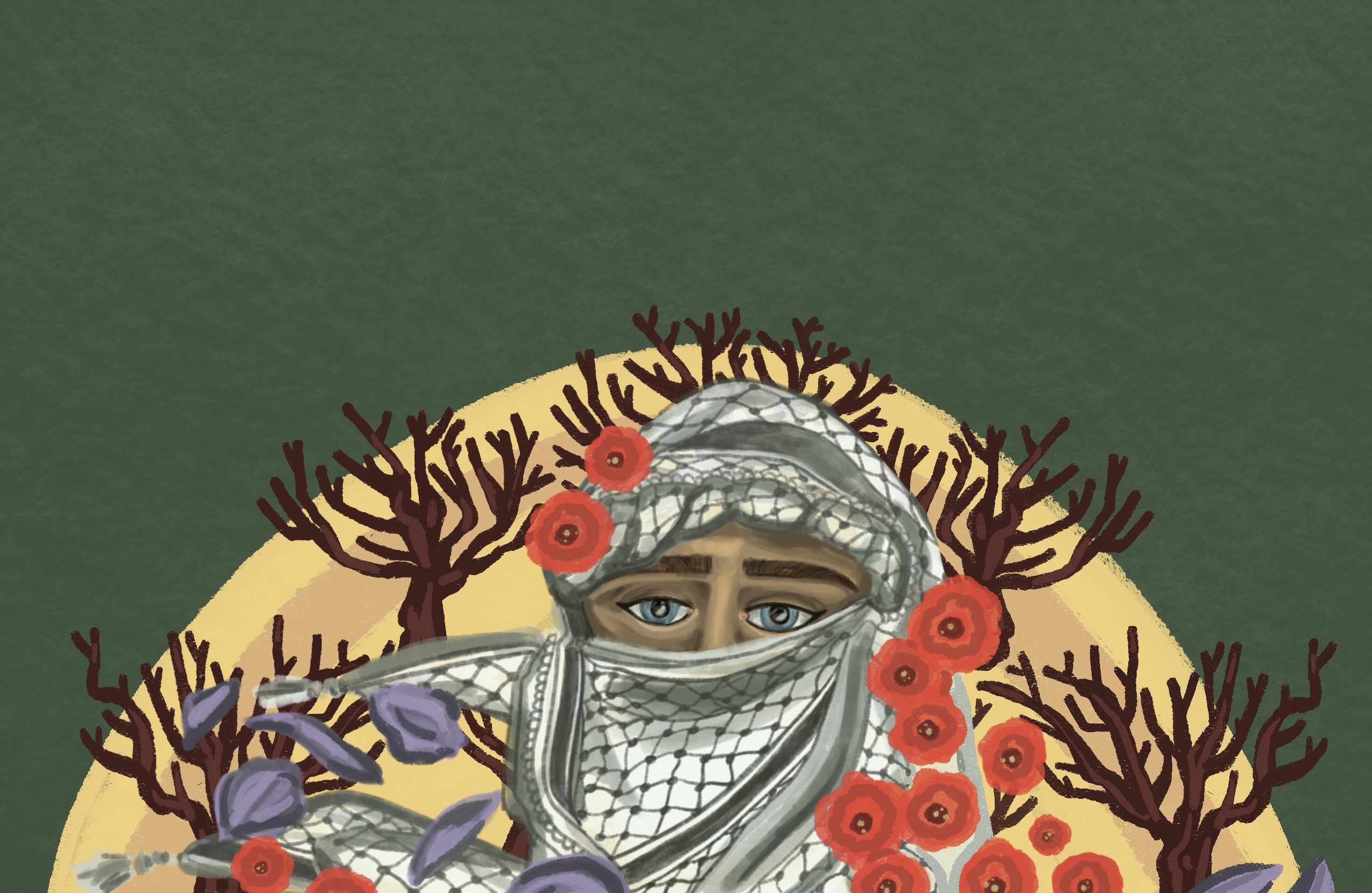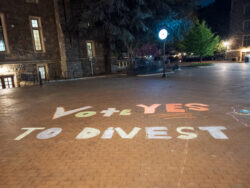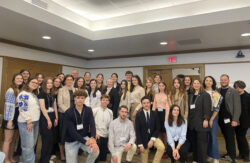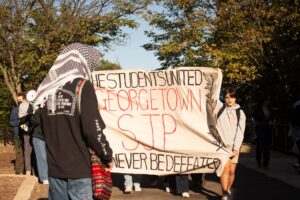Content warning: This article includes mentions of racism, Islamophobia, and an anti-Palestinian hate crime.
Donia, an international Palestinian graduate student who spoke to the Voice on the condition that she be identified only by her first name, sent an email on Nov. 8 to university administrators titled, “My family has been KILLED – University’s Silence on Genocide.” In the email, she wrote that 52 members of her mother’s family, including 17 children, had been killed in Gaza since Oct. 7.
This was one of several emails Donia sent to administrators asking to meet with President DeGioia and urging him to echo Pope Francis’s calls for a ceasefire in Palestine. She has also urged the university to send an email condemning reported incidents of anti-Palestinian harassment on campus.
Administrators responded to Donia’s emails privately, resulting in a one-on-one meeting with Vice President and Chief of Staff Joseph Ferrara. While Ferrara listened to her stories and expressed sympathy, Donia feels the university has not adequately recognized her family’s suffering.
“I’m so frustrated with how Georgetown does not acknowledge what we’re seeing. I met with administration, I sent them emails. They keep telling me how their heart is broken because of my stories, and no action,” she said.
Many Palestinian students, and those in solidarity with them, want administrators to openly condemn Israel’s ongoing genocide in Gaza, which has killed over 24,000 Palestinians. Students also want the university to explicitly denounce recent incidents of anti-Palestinian harassment both on- and off-campus.
On Oct. 8, President DeGioia sent a university-wide email condemning Hamas’ Oct. 7 attack on Israel and mourning the loss of Israeli lives. Many Palestinian students, and those in solidarity with them, responded by calling on the university to also recognize Israel’s airstrikes on Oct. 7, the subsequent loss of Palestinian lives, and Israel’s 75-year occupation of Palestine.
“The initial email sent by the university was an embarrassment. It didn’t even mention the word Palestinian,” a Palestinian American undergraduate student who spoke on the condition of anonymity said in an interview with the Voice.
Members of the Palestinian community at Georgetown met with DeGioia to ask him to release another statement acknowledging the suffering of Palestinians, which he did on Oct. 19. Many students saw this email as an improvement to DeGioia’s first email, but still expressed frustration with DeGioia’s wording, specifically his characterization of the genocide in Gaza as a “humanitarian crisis.”
“‘Humanitarian crisis’ implies that there may or may not be a perpetrator. There could be a humanitarian crisis from a natural disaster where there’s no human perpetrator. This is a man-made crisis,” the Palestinian American student who spoke on the condition of anonymity continued.
Since October, students have called on the university to recognize and condemn Israeli violence against Palestinians by meeting with administrators, holding on-campus demonstrations, and circulating a list of demands which has received nearly 1,000 signatures. Many Palestinian students expected the university to release additional communications, given the escalation of suffering in Palestine since then.
“[It’s] just the fact that there hasn’t been a follow up email since mid-October, when the death toll has gotten so much worse,” Anna Wessels (G ’24), a Palestinian American student, said. “I think it’s a really clear omission that they don’t feel the need to reach out to us.”
In response to requests to comment on safety and communication concerns Palestinian students expressed, a university spokesperson wrote: “Georgetown University strongly condemns antisemitism, Islamophobia, racism, and hatred of any kind in our community. We do not tolerate harassment, discrimination, intimidation or threats of harm.”
“We are deeply committed to fostering a safe, welcoming and inclusive community that respects the inherent dignity and shared humanity of each Hoya, promotes the free expression of ideas, and enables every member of our community to thrive,” the spokesperson wrote.
Many Palestinian students described a lack of individualized support from university administrators, especially Palestinian international students.
“I’m registered in the data as a Palestinian. No [university administrators] reached out to me at all,” Donia said in an interview with the Voice.
Though Georgetown does not have a publicized policy regarding how it offers public and private support for international students facing crises in their home countries, students say the university has responded very differently to other international crises.
When Russia invaded Ukraine on Feb. 24, 2022, Fr. Mark Bosco, vice president for Mission and Ministry, sent a campuswide email expressing support for Georgetown’s Ukrainian community. Administrators promoted campuswide efforts to bring awareness to the situation, allowing Ukrainian students to feel uplifted on campus while navigating the state of affairs back home, according to Olha Kovach (SFS ’26), a Ukrainian student from Kyiv.
Similarly, when a 6.8 magnitude earthquake struck Morocco in September 2023, university administrators responded with individual and campus-wide emails addressing those impacted.
“I got an email from the school about the earthquakes, asking if my family was okay,” a Moroccan student (G ’24) said in an interview with the Voice. “But I was very disappointed to hear that none of my Palestinian friends were contacted, even those who are international students from Palestine.”
After hearing about administrators’ timely and empathetic communications with her peers, Donia felt the university did not see her as equally deserving of support.
With a perceived lack of recognition from the university, many Palestinian students feel that the onus is on them to call attention to the continuing violence against Palestinians, even when this means discussing the murder of their own family members.
“We feel this responsibility to educate, to convince people why they should care, while we’re watching this devastation and extreme violence happen to our people, while we’re also trying to finish our finals and go to class every day,” Wessels said. “So it’s a lot of pressure and it shouldn’t be put on individual students.”
Palestinian students said they feel an expectation to continue engaging in campus life normally. This inhibited their ability to grieve their loved ones, resulting in a dissonance between their everyday lives at Georgetown and the events unfolding in Gaza.
“I feel like I’m kind of living in a parallel universe in Georgetown, where there’s a few people talking about it and speaking up, but the majority of what’s going on, people are just going about their lives like there’s not like thousands of people being killed every day in a very sustained effort funded by the U.S. government,” Wessels said.
Palestinian students described feeling unsafe on campus knowing hate crimes and hate incidents against Palestinians have risen across the United States.
“I’ve been called a racist. I’ve been called a terrorist. I’ve been called Nazi on campus,” Donia said.
Palestinian and pro-Palestine students at Georgetown have faced harassment and threats on campus from members of the Georgetown community and bad-faith actors. According to several students, this harassment included having their photos taken in Red Square, a free speech zone, while hanging flyers that brought awareness to the genocide in Gaza. Reporters from conservative news outlets have also come to Students for Justice in Palestine (SJP) events on campus to take photos of students’ faces and post them online while mischaracterizing SJP as “pro-Hamas.”
On Oct. 17, several Georgetown students characterized pro-Palestine students as Hamas sympathizers on Fox & Friends. On Oct. 21, a Fox News article included interviews with members of Georgetown Law Zionists saying pro-Palestinian students at Georgetown condoned terrorism and antisemetic violence. This article exposed the personal Instagram account of a Palestinian law student, after which he received multiple death threats via Instagram. The article was edited on Oct. 30 to remove the student’s name. Several days later, a mobile billboard truck, parked outside of McDonough Hall, both called for the university to stop recognizing SJP and read, “ISIS has no place on campus.”
According to the students affected, who spoke on the condition of anonymity, they brought these incidents to the attention of university administrators at the law campus. They said that while administrators were apologetic in meetings, they directed the students to the bias reporting system and did not promise to take any action.
Another Palestinian American undergraduate student, who spoke on the condition of anonymity, described a meeting with President DeGioia in which she and other students recounted on-campus harassment. She said that throughout the meeting, students were pointed towards the university’s bias reporting system, rather than being informed of any proactive steps the university is taking to prevent this harm from occurring.
“[The administration is] like, ‘Well, these things might happen to you, and the only thing you can do about it is report, and there’s not really much that we can do to stop that,’” she said. “That definitely contributes to my fear on campus.”
The Palestinian student, who is an SJP board member, described an incident in October when an administrator sent an email to her, as well as leaders of the Jewish Student Association and the Georgetown Israel Alliance, inadvertently exposing her name and Georgetown email. She shared that she has worked to remain anonymous in her activism due to the violence that pro-Palestine activists are facing.
The student met with the administration to explain how being publicly identified could expose her to doxxing and other forms of harassment. She said that the administrator was receptive to her concerns, and future emails were sent using blind carbon copy. But the incident made her realize how little the administration knows about the risks Palestinian students are facing.
“I feel like even in the situations where the administration is trying to help, they’re just so naive to what Palestinian students actually have to deal with and the fears that they have to deal with, like doxxing and harassment,” she said.
The student’s safety concerns have increased as violence against Palestinians in the United States has escalated, including a recent shooting of three Palestinian college students in Vermont. The shooting, which is being investigated as a possible hate crime, left all three students injured and one paralyzed from the chest down.
The Georgetown student said that one of the survivors of the shooting is a family friend.
The student expressed disappointment that Georgetown did not send out an email condemning the shooting. The university’s lack of public condemnation of anti-Palestinian hate crimes in the U.S. has made Palestinian students feel they cannot trust the university to protect them from harassment, doxxing, and threats of violence from other Georgetown community members.
“The Georgetown administration as a whole has not created an environment that holds people accountable for harassing Muslims and Arabs, for attacking Muslims and Arabs. They have not created an environment where Palestinians feel safe,” the first Palestinian American student who spoke anonymously said. “They have actively contributed to the situation that made hate crimes like this possible.”
Beyond feeling physically unsafe, Palestinian students have also described feeling verbally attacked in classrooms, where their experiences have been questioned and invalidated. Selina, a Palestinian American undergraduate student who spoke on the condition that she be identified only by her first name, described feeling targeted by other students in a class discussion. She was the only Palestinian, Arab, or Muslim student in the class discussion, which took place just days after her aunt had been killed in an Israeli attack.
In class, students used dehumanizing language and repeated false narratives about Palestinians to justify Israel’s indiscriminate attacks on civilians, Selina said. At a certain point, she got up and left the room crying.
“I think what made me upset was the fact that basically so many students, A, had misinformation, and B, were basically referring to my dead family members as collateral,” Selina said.
The ongoing genocide has deeply impacted Palestinian students like Selina with families in Gaza. Inaction from university administrators combined with a lack of empathy from students has made Palestinian students feel alienated from the campus community in a time of need.
“I feel like this is not my campus anymore,” Donia said. “I just don’t feel like I’m being heard or respected or acknowledged as a Palestinian.”
Editor’s note: This article was updated 4/19/25 at 3:18 p.m. to strike a name.






